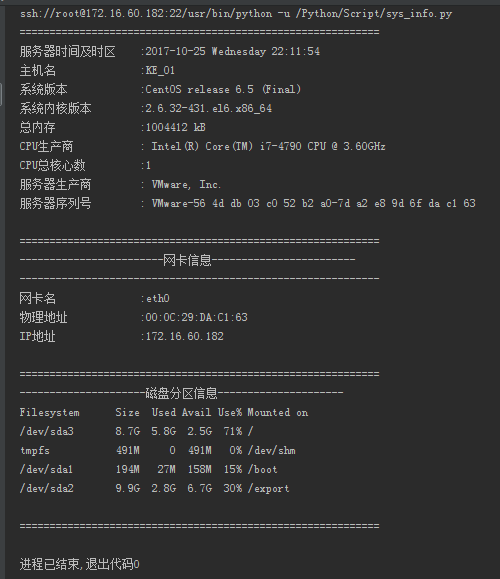该脚本主要用来统计CentOS,RedHat 6~7系统版本的服务器基础信息,方便自己检查新服的配置。
#!/usr/bin/python
# coding: utf8
from subprocess import Popen, PIPE
import time
import re
import os
# 获取主机名
def host_name():
hostname = Popen(["hostname"], stdout=PIPE)
hostname = hostname.stdout.read()
return hostname
# 获取操作系统版本
def os_version():
with open("/etc/redhat-release") as f:
os_version = f.read()
return os_version
# 获取操作系统内核版本
def os_core_version():
os_core_version = Popen(["uname", "-r"], stdout=PIPE)
os_core_version = os_core_version.stdout.read()
return os_core_version
# 获取CPU相关信息
def cpu_info():
core_number = []
with open("/proc/cpuinfo") as cpu_info:
for i in cpu_info:
if i.startswith("processor"):
core_number.append(i)
if i.startswith("model name"):
cpu_mode = i.split(":")[1]
return len(core_number), cpu_mode
# 获取内存相关信息
def mem_info():
with open("/proc/meminfo") as mem_info:
for i in mem_info:
if i.startswith("MemTotal"):
mentotal = i.split(" ")[-2:]
mentotal = ' '.join(mentotal)
return mentotal
# 获取服务器硬件相关信息
def bios_info():
bios_info = Popen(["dmidecode", "-t", "system"], stdout=PIPE)
bios_info = bios_info.stdout.readlines()
for i in bios_info:
if "Manufacturer" in i:
manufacturer = i.split(":")[1]
if "Serial Number" in i:
serialnumber = i.split(":")[1]
return manufacturer, serialnumber
# 获取服务器的时间信息
def Time_info():
time_info = time.strftime('%Y-%m-%d %A %X', time.localtime())
# time_info = Popen(["date", "-R"], stdout=PIPE)
# time_info = time_info.stdout.read()
return time_info
# 使用ifconfig获取网卡信息
def getIfconfig():
p = Popen(['ifconfig'], stdout=PIPE)
data = p.stdout.read().split('\n\n')
return [i for i in data if i and not i.startswith('lo')]
# 对ifconfig的输出信息进行筛选
def parseIfconfig(data):
dic = {}
for line in data:
re_devname = re.compile(r'(\w+).*Link encap', re.M)
re_macaddr = re.compile(r'HWaddr\s([0-9A-F:]{17})', re.M)
# re_ipaddr = re.compile(r'inet addr: ([\d\.]{7, 15})', re.M)
re_ipaddr = re.compile(r'inet addr:([\d\.]{7,15})', re.M)
devname = re_devname.search(line)
mac = re_macaddr.search(line)
ip = re_ipaddr.search(line)
if devname:
devname = devname.group(1)
else:
devname = ''
if mac:
mac = mac.group(1)
else:
mac = ''
if ip:
ip = ip.group(1)
else:
ip = ''
dic[devname] = [mac, ip]
return dic
# 获取磁盘相关信息
def disk_info():
disk_info = Popen(["df", "-h"], stdout=PIPE)
disk_info = disk_info.stdout.read()
return disk_info
# 格式对齐函数
def myAlign(string, length=0):
if length == 0:
return string
slen = len(string)
re = string
if isinstance(string, str):
placeholder = ' '
else:
placeholder = u' '
while slen < length:
re += placeholder
slen += 1
return re
if __name__ == '__main__':
# 初始化相关对象
hostname = host_name()
osversion = os_version()
oscoreversion = os_core_version()
totalmem = mem_info()
cpunumber, cpumode = cpu_info()
manufacturer, serialnumber = bios_info()
timeinfo = Time_info()
data = getIfconfig()
ipinfo = parseIfconfig(data)
diskinfo = disk_info()
width = 60
print '%s' %("".center(width, '='))
print myAlign(u"服务器时间及时区", 10) + ":" + myAlign(str(timeinfo))
print myAlign(u"主机名", 10) + ":" + myAlign(str(hostname)),
print myAlign(u"系统版本", 10) + ":" + myAlign(str(osversion)),
print myAlign(u"系统内核版本", 10) + ":" + myAlign(str(oscoreversion)),
print myAlign(u"总内存", 10) + ":" + myAlign(str(totalmem)),
print myAlign(u"CPU生产商", 10) + " :" + myAlign(cpumode),
print myAlign(u"CPU总核心数", 10) + " :" + myAlign(str(cpunumber))
print myAlign(u"服务器生产商", 10) + ":" + myAlign(str(manufacturer)),
print myAlign(u"服务器序列号", 10) + ":" + myAlign(str(serialnumber)),
print ""
print '%s' %("".center(width, '='))
print '%s' %("网卡信息".center(width, '-'))
for x in ipinfo:
print '%s' %("".center(width, '-'))
print myAlign(u"网卡名", 10) + ":" + myAlign(str(x))
print myAlign(u"物理地址", 10) + ":" + myAlign(str(ipinfo[x][0]))
print myAlign(u"IP地址", 10) + " :" + myAlign(str(ipinfo[x][1]))
print ""
print '%s' %("".center(width, '='))
print '%s' %("磁盘分区信息".center(width, '-'))
print diskinfo
print '%s' %("".center(width, '='))
-
输出结果显示
